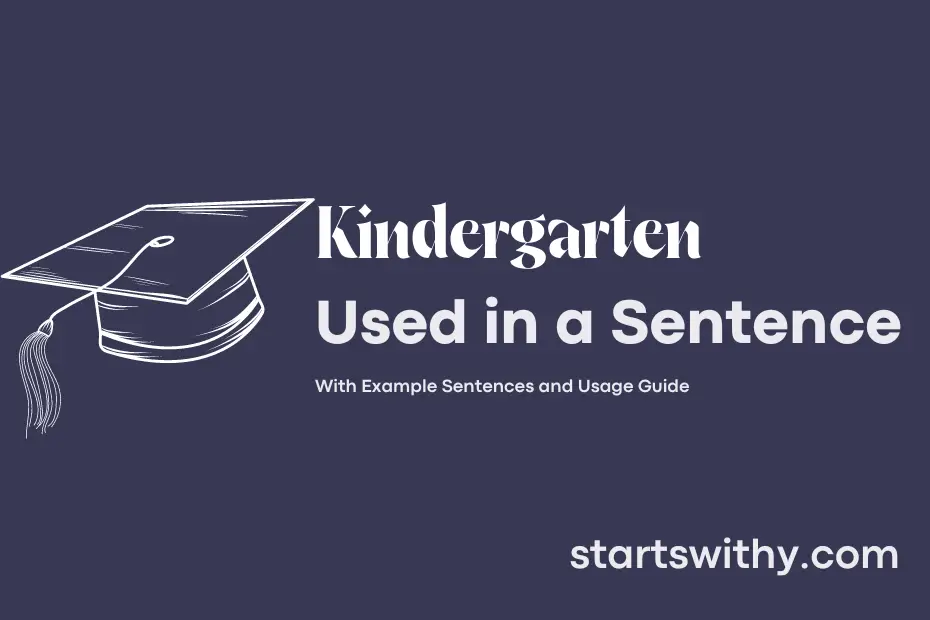Are you familiar with the term “kindergarten”? Kindergarten is the first year of formal education for young children, usually between the ages of four and six. It is a crucial stage in a child’s development, where social, emotional, and cognitive skills are nurtured and cultivated.
During kindergarten, children are introduced to basic academic concepts such as numbers, letters, colors, and shapes. It is also a time for them to learn how to interact with their peers, follow instructions, and develop independence. Kindergarten sets the foundation for a child’s future academic success and overall well-being.
7 Examples Of Kindergarten Used In a Sentence For Kids
- In kindergarten, we learn our ABCs and 123s.
- My friends and I play together in kindergarten.
- The teacher helps us learn new things in kindergarten.
- We color and draw pictures in kindergarten.
- We have snack time in kindergarten.
- I love going to kindergarten every day.
- Kindergarten is a fun place to make new friends.
14 Sentences with Kindergarten Examples
- Kindergarten teachers play a crucial role in shaping young minds.
- Many college students reminisce about their time in kindergarten.
- The kindergarten curriculum focuses on developing social and cognitive skills.
- Understanding child psychology is essential for working in a kindergarten.
- College students studying education often observe kindergarten classrooms for field experience.
- Effective communication with parents is key for a successful kindergarten program.
- Learning about creative teaching methods is beneficial for kindergarten educators.
- Kindergarten students often have a lot of energy and need engaging activities.
- Incorporating arts and crafts is a common practice in kindergarten classrooms.
- College students majoring in early childhood education often specialize in kindergarten teaching.
- Understanding the importance of playtime is crucial for kindergarten teachers.
- Kindergarten assessments focus on tracking a child’s progress in various skills.
- College students learn about child development theories that are applied in kindergarten settings.
- Volunteer opportunities in kindergarten programs can provide valuable hands-on experience for college students.
How To Use Kindergarten in Sentences?
Kindergarten means the first year of formal education for young children, usually between the ages of 4 and 6. It is an important stage in a child’s development as it lays the foundation for their future academic and social success. When using the word kindergarten in a sentence, it is important to remember the following:
-
Capitalization: Always capitalize the word kindergarten when referring to the specific educational level. For example, “My daughter will start Kindergarten next year.”
-
Article: When using kindergarten in a sentence, it is often preceded by the definite article “the” or the possessive pronoun “my.” For instance, “The kindergarten teacher is very patient” or “My son loves his kindergarten class.”
-
Verb Usage: Kindergarten is a singular noun, so it should be paired with singular verbs. For example, “The kindergarten program begins at 8 AM.”
-
Context: Consider the context in which you are using the word kindergarten to ensure it is appropriately placed within the sentence.
Overall, using kindergarten in a sentence is simple and straightforward. By following these guidelines, beginners can effectively incorporate the word into their writing or conversations.
Conclusion
In conclusion, sentences with “kindergarten” refer to statements that typically involve activities, routines, or experiences related to the first year of formal education for young children. These sentences often depict the learning environment, curriculum, social interactions, and growth of students at this crucial developmental stage in their lives. Examples include describing kindergarten classrooms, teachers, learning materials, and the daily schedule of a typical kindergarten student.
Overall, sentences with “kindergarten” evoke images of bright, stimulating spaces filled with exploration, play, and foundational learning experiences for young learners. They highlight the importance of early education in shaping children’s academic, social, and emotional development, setting the stage for their future success in school and beyond.



